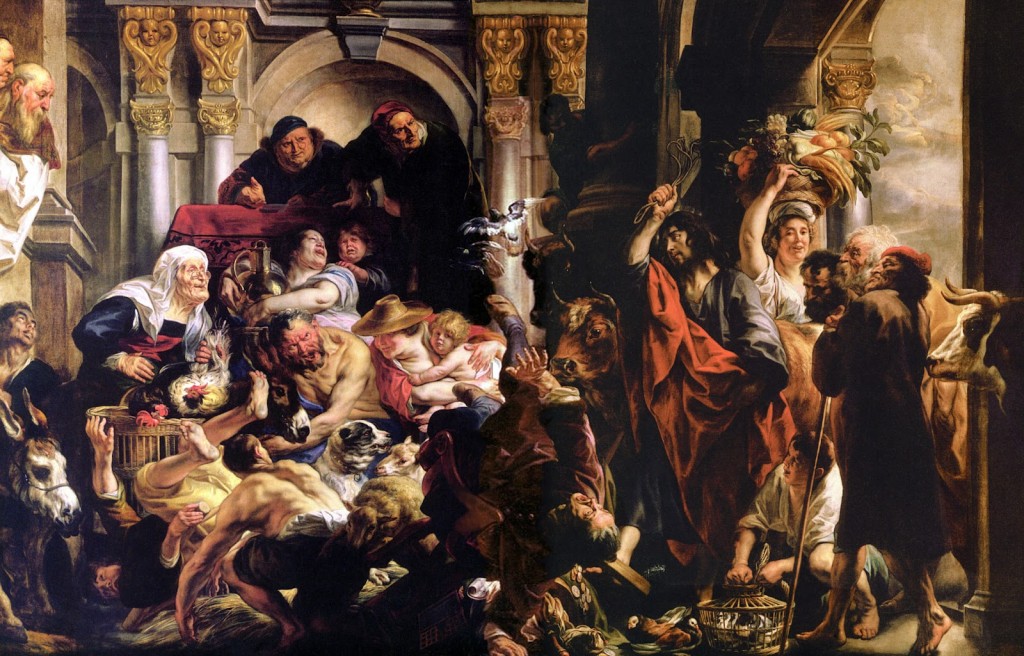Jesus, the Law, the Jews—and Us
Third Sunday of Lent

“Jesus answered and said to them, ‘Destroy this temple and in three days I will raise it up.'” John 2:19
For pious Jews in first-century Palestine, the Mosaic Law prescribed the way every action in life is dedicated to God. Today’s reading from Exodus tells how the Ten Commandments, the reintroduction to this larger legal code, is given to Israel as a gift from God.
In the Gospels Jesus is portrayed as a rabbi, or someone learned in the Law. A rabbi’s learning ideally included both the precepts of the Law and its reverent contemplation as a divine gift, — within which one could hear God’s own voice.
This was the way rabbis through the centuries used the Law to adapt to changing circumstances. This seems to be what Jesus was doing with the moneychangers in the temple.
When Jesus accused the moneychangers of sacrilege and cleared them out of the temple, the onlookers asked for a sign of his authority to do such a thing. After all, wasn’t it a sacrilege to purchase animals for sacrifice with pagan coins? Wasn’t this how the Jews adapted to Roman rule? Jesus says nothing about that; he only knows that this commercial activity inside the temple was a sacrilege. Elsewhere in the Gospels Jesus is criticized for not being strict enough with the Law, as when he ate with prostitutes and tax collectors, but here he is prescribing something stricter, something “more.”
Jesus is doing something extraordinary, contrary to ordinary practice, prompting the onlookers to request a sign, evidence that God is acting here through Jesus. His insistence that the moneychangers depart, his clear vision regarding “my Father’s house,” and his cryptic reference to himself as a temple, are signs of his contemplative intimacy with his Father that is the source of his authority about the Law.
Catholics, like first-century Jews, have our regular means for living in God’s presence. We have the liturgy, sacraments, devolions, and personal prayer. During Lent, we are asked to be a little stricter with ourselves, listening for God’s own voice. If we do, we might discover that we, too, are being called to something “more.”
Readings of the Week
Monday: 2 Kgs 5:1-15b; Ps 42:2, 3; 43:3, 4; Lk 4:24-30
Tuesday: Dn 3:25, 34-43; Ps 25:4-5ab, 6-7bc, 8-9; Mt. 18:21-35
Wednesday: Dt 4:1, 5-9; Ps 147:12-13, 15-16, 19-20; Mt 5:17-19
Thursday: Jer 7:23-28; Ps 95:1-2, 6-9; Lk 11:14-23
Friday: Hos 14:2-10; Ps 81:6c-11ab, 14, 17; Mk 12:28-34
Saturday: Hos 6:1-6; Ps 51:3-4, 18-21ab; Lk 18:9-14
Sunday: 2 Chr 36:14-16, 19-23; Ps 137:1-6; Eph 2:4-10; Jn 3:14-21
Saints & Special Observances
Sunday: Third Sunday of Lent; First Scrutiny
Monday: St. John of God
Tuesday: St. Frances of Rome
Friday: Abstinence
